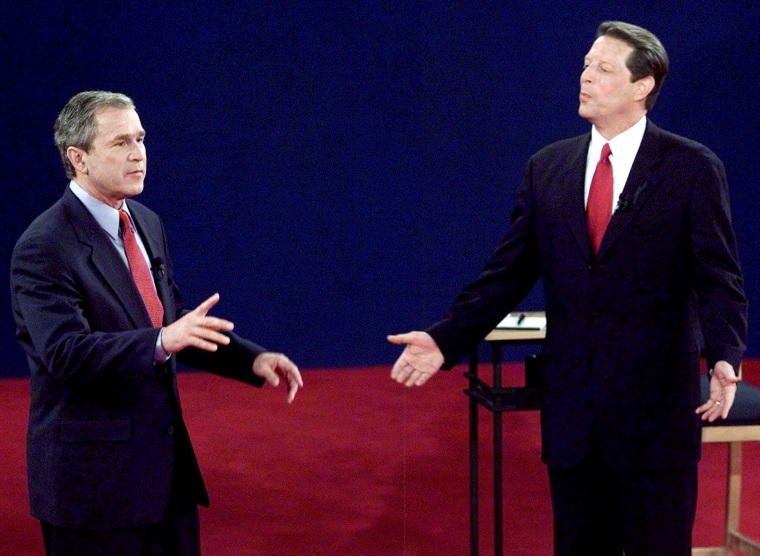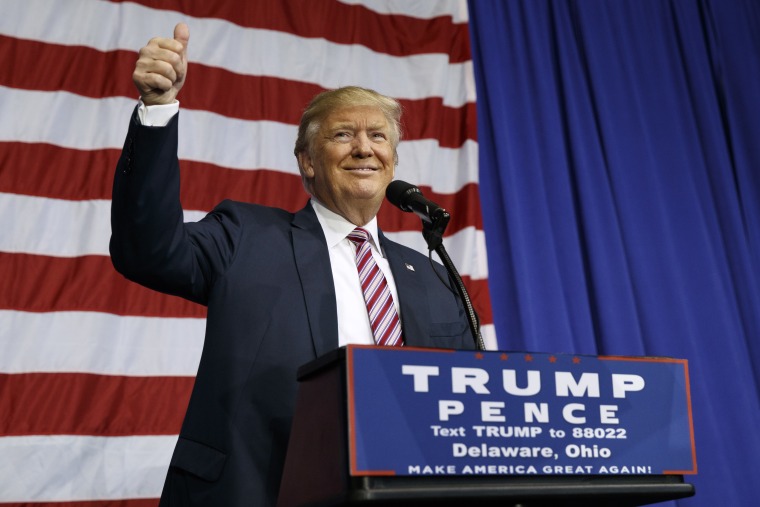In trying to defend Donald Trump's refusal to say at Wednesday's debate that he'd accept the results of the presidential election, his surrogates are latching on to what they say is a recent historical parallel: the 2000 Florida recount.
Vice President Al Gore took more than a month to accept the election results, they note. So what's wrong with Trump's taking a wait-and-see approach?

A closer look at what happened in Florida — and at Trump's full comments and their context — makes it clear that there's little comparison between the two situations.
Gore used his legal options to contest an agonizingly close result — and there's still no consensus on whether the right candidate was ultimately declared the winner.
Trump, by contrast, put no such limit on what might justify contesting the results. And his remarks came after he's already spent weeks riling up his supporters by insisting, without offering any evidence, that the election is being "rigged."
(In his first comments since the debate, Trump said Thursday that he would accept the general election results — "if I win.")
Trump's debate answer provoked widespread outrage, even among many Republicans. Sen. Lindsey Graham, R-S.C., said Trump was "doing the party and country a great disservice."
Hillary Clinton, responding onstage, called it "horrifying," adding: "That is not the way our democracy works."
Several independent commentators have agreed.
But in the post-debate "spin room," Trump's campaign manager, Kellyanne Conway, defended his remarks, citing Gore in 2000.
"He conceded the election to George W. Bush, and then he retracted his concession and he went all the way to the Supreme Court," Conway told NBC's Hallie Jackson.
Related: Trump's Rigged Election Rhetoric 'Dangerous,' Obama Says
Here's what happened in 2000: On Election Night, Nov. 7, the major TV networks called Florida for Bush (after earlier in the night having called it for Gore), prompting Gore to concede in a phone call to his opponent.
But upon learning that Bush's margin was only 1,784 votes — close enough to trigger an automatic recount under state law — Gore called Bush back to withdraw his concession.
The recount and the subsequent scrutiny of the Florida vote revealed numerous irregularities in the state's electoral process — among them, a flawed purge of about 12,000 legal voters from the rolls after they were wrongly identified as felons.
On Dec. 9, a 5-4 majority of the U.S. Supreme Court ordered a halt to the recount, handing victory to Bush. The court also ruled that the existence of different rules in different counties violated the Constitution's equal protection clause.
The controversial decision went out of its way to note that it set no precedent, and it has almost never been cited since — fueling Democratic claims that it was reverse-engineered to ensure that Bush would become president.
Even today, it's not clear that Bush actually got more votes than Gore in Florida.
Still, in a speech to the nation four days later, Gore congratulated Bush on becoming president.
"I say to President-elect Bush that what remains of partisan rancor must now be put aside, and may God bless his stewardship of this country," Gore said.
It's true that Gore didn't accept the results on Election Night. And had Trump said Wednesday night that he'd accept the results barring a very close outcome that required further scrutiny, few would have objected.
Instead, Trump opened the door much wider.
Related: November Surprise? Trump's Debate Warning Threatens to Split GOP
Asked by moderator Chris Wallace whether he would "accept the result of this election," Trump replied: "I will look at it at the time. I'm not looking at anything now. I'll look at it at the time."
Trump then went on to explain his answer, saying nothing about a close election.
He didn't limit his answer to the threat of illegal voting; instead, he referred to what he sees as media bias against him and then added that Clinton "shouldn't have been allowed to run" in the first place because of her mishandling of emails during her term as secretary of state.
"Just in that respect, I say it's rigged," he said.
In other words, Trump's rationale for doubting the election results is that he views the entire process as "corrupt" — not simply that there might be voting or vote-counting irregularities in a close election.
Should Trump choose to stick with his claim that Clinton should have been barred from running, it could allow him to tell his supporters that the election was illegitimate no matter how heavily Clinton might have won. It already appears likely that some share of Trump voters will see things that way should Clinton win.
Trump wasn't making these claims for the first time. That the entire process is rigged is an argument he's made a centerpiece of his campaign, and there's evidence that it's causing his supporters to lose faith in the process.
Trump's refusal to say Wednesday that he'd accept the results of the election appears to many to pose a potential threat to America's tradition of peaceful transfers of power — a tradition at the heart of our democratic system. Gore's actions in 2000 posed no such threat.
